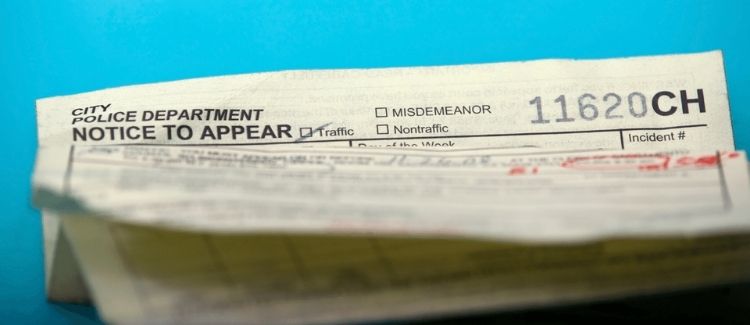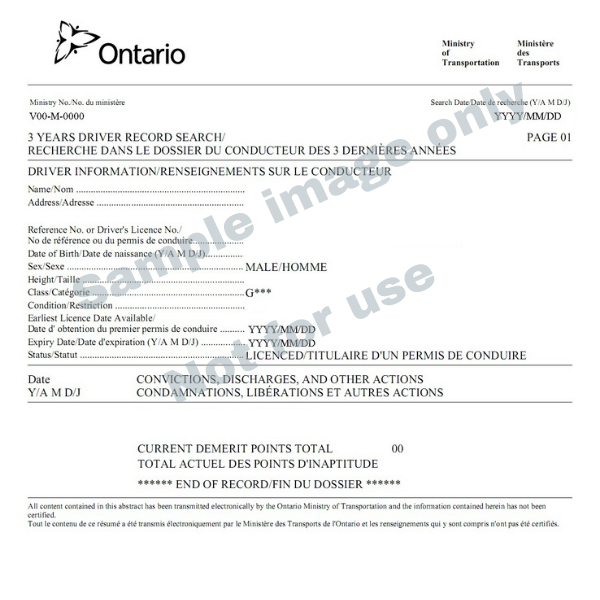You’re applying for a new car insurance policy and you’re going over the last few years in your mind. There was that one minor speeding ticket…and then that fender bender 6 years ago…but will that count? When it comes to car insurance premiums, many people wonder: how do insurance companies check driving records?
Most of us have activity within the last 3 to 5 years, so you’re not alone if you can’t remember what exactly is in those documents. Insurers check driving records with something called a driver’s abstract. It’s not for their exclusive use, either—you can order one yourself if you’d like.
What is a driver’s abstract?
Also called motor vehicle record (or MVR for short), your driver’s abstract is a record of your driving history that includes:
- Traffic tickets
- Demerit points
- Driver’s license suspensions
- Driver training
Contrary to popular opinion, driver’s abstracts do not show your accidents. Beyond that, Ontario has several different types of records you can order, but typically insurance companies are interested in your driver’s license history and a 3- or 5-year driver’s record. You can check your Ontario driving record too, if you’re curious.
3-year driver’s record
This is the most commonly requested report. It may also be necessary for employers if you are going to be driving a company vehicle, and possibly even needed by other provinces or territories if you’re driving that company vehicle outside of Ontario. That’s more for commercial insurance, however, not personal policies.
The report includes:
- Driver identification details.
- Total demerit points.
- Active fine suspensions.
- Driving convictions as per the Highway Traffic Act and Criminal Code of Canada convictions.
- Suspensions and reinstatements over the past 3 years.
Pro tip: You don’t need to worry about red light camera tickets leading to demerit points because the cameras can’t be used to verify the driver inside the vehicle at the time. Those tickets correspond to your license plate but not your personal driving record.
How do insurance companies check driving records for license histories?
This record will show any suspensions or driving courses, both of which can affect your insurance rates significantly. This can only be requested by the driver, a Canadian law-enforcement agency, and by court order.
The history includes:
- Driver identification details.
- Ontario Beginner Driver Education course completion.
- A list of current and all residential addresses recorded on the record.
- All driver’s license replacements, renewals, class changes and any other changes.
5-year driver’s record: This report is the same as the three-year record, except that it includes five years of information instead of three. Insurers prefer this to verify longer-term experience.
Extended driver’s record: This is a very specific report that’s mainly used for legal reasons and when you need to demonstrate your long-term driving history.

Complete or freedom of information driver’s record: This is typically only needed in legal situations to show licensing details and a complete driving history—you might need this if you are defending yourself against a traffic violation, for example.
Collision or accident report: You’ll need a car accident report as evidence if you are defending yourself in court over a collision.
Copies of driver documents: These are not usually requested by insurance companies, they are for legal situations. These documents can include your original driver’s license application, conviction reports, suspension notices, etc.
Driver confirmation letter: This is only required if you’re applying to drive in another province, territory, or country outside of Ontario.
Driver’s license check
How do insurance companies check driving records to confirm your license status? They may have access to one of several databases containing that information. It’s important for them to know if your license is currently valid because it can affect several things—such as your eligibility to drive and the validity of your car insurance policy, for starters.
What driver identification details are visible?
Some reports like the 3 Year Driver’s Record include information about yourself, such as:
- Your name
- Driver’s license number
- Date of birth
- Sex
- Height
- Class
- Conditions and endorsements (e.g. glasses needed to drive)
- Status (licensed, unlicensed, suspended)
- Earliest license date available
- Expiry date
What driving record information cannot be seen by insurance companies?
For privacy reasons, your current residential address is not disclosed on most reports in most cases. Your driving record will also not include tickets for non-moving violations or any criminal history beyond driving, although most non-moving violations (parking tickets) won’t affect your car insurance rates.

What else do insurance companies check?
Good question. Although your driver’s abstract is a very important piece of the puzzle, there are other resources that insurance companies use to provide you with a quote or to renew your policy.
For example, there is an insurance history database called Autoplus that provides information like:
- Previous claims you’ve made.
- Accidents and violations.
- Long-term insurance history.
- Claims made against you.
- Cancellations for things like non-payment or underwriting reasons.
- A list of vehicles you’ve insured to-date.
- A list of drivers in your household (past, current, and potential drivers included).
We can’t speak for every other insurance brokerage out there, but at aha insurance we use the driver’s abstract (motor vehicle record) and other database information to keep the quote process smooth.
What’s the difference between certified and uncertified driver’s records?
The information in certified and uncertified driver’s records is the same, but a certified driver’s record includes the Ministry of Transportation of Ontario’s embossed seal. How do insurance companies check driving records reliably if the requests don’t come with that seal? They use trustworthy databases (sometimes even the Ministry of Transportation’s own)
You will need the certified version for any legal purposes, like appearing in court to defend yourself against a careless driving ticket.
What if I have a clean driving record?
When you have a completely clean record, then you’re in a position to receive better rates compared to drivers with poor or moderate driving histories (everything else being equal). Huzzah!
If that sounds like you, then check out these other potential car insurance discounts—plus some factors that can nudge your rates in the right direction:
- Multi-car discount.
- Multi-policy discount (think “bundle”).
- Strong car safety features.
- Private parking.
- Winter tires installed.
- Occupational discount (i.e. certain professional associations are given a discount rate, like engineers).
- Driving primarily for leisure rather than for work.
- Farmer discount (if you live on a farm).
- Driver training.
That’s how insurers check driving records and what they look for when they get those records. Your driving history is the single biggest factor that underwriters consider for your auto insurance rates. Keep an eye on your records and stay out of collisions to get the best rates in the long term!






